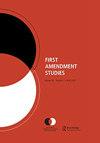网络上最大的谎言:接受未能解读第一修正案的事实
Q2 Social Sciences
引用次数: 1
摘要
随着在线公共空间和私人空间之间的界限不断模糊,合同越来越接近政府参与者参与其中的那一天。当超过90%的在线用户没有阅读社交媒体网站的服务条款(ToS)协议时,他们没有意识到盲目同意这些未读合同可能带来的后果,包括潜在地放弃他们的一些宪法权利。其中最主要的是宪法第一修正案赋予他们的向法院请求政府救济的权利。在大多数ToSs中,在线用户必须同意在网站所有者选择的地点进行强制仲裁。其次是宪法赋予他们的知识产权独享权。通过一项在线调查(N = 235),本文报告了有关受访者对阅读ToSs的态度,他们的人口统计信息以及他们接受Twitter论坛选择条款的可能性的数据,这违背了他们潜在的宪法权利。两个主要发现是:(a)教育对拒绝b谷歌不利的版权相关条款的可能性没有影响;(b) 63.2%表示在任何情况下都不会接受不利的Twitter论坛选择条款的人确实属于或曾经属于Twitter。本文章由计算机程序翻译,如有差异,请以英文原文为准。
The biggest lie on the web: Coming to terms with the failure to read through the lens of the First Amendment
Abstract As lines between public and private spaces online continue to blur, contracts are moving closer to the day when government actors will be involved in all of them. When 90%+ of online users do not read the terms-of-service (ToS) agreements of social media sites, they are unaware of possible repercussions of blindly assenting to these unread contracts, including potentially relinquishing a number of their constitutional rights. Primary among these is their First Amendment right to petition the government for relief in a court of law. In most ToSs, the online user must agree to mandatory arbitration in the site owner’s venue of choice. Secondary is their sole right to their intellectual property afforded by the Constitution. Through an online survey (N = 235), this article reports data concerning respondents’ attitudes toward reading ToSs, their demographic information, and their likelihood of accepting a forum-selection term from Twitter, contrary to their potential constitutional rights. Two major findings are that: (a) there was no effect of education on the likelihood of rejecting Google’s unfavorable copyright-related terms; and (b) 63.2% of those who state they would not, under any condition, accept the unfavorable Twitter forum-selection term do, indeed, belong to or have belonged to Twitter.
求助全文
通过发布文献求助,成功后即可免费获取论文全文。
去求助
来源期刊

First Amendment Studies
Social Sciences-Law
自引率
0.00%
发文量
0
期刊介绍:
First Amendment Studies publishes original scholarship on all aspects of free speech and embraces the full range of critical, historical, empirical, and descriptive methodologies. First Amendment Studies welcomes scholarship addressing areas including but not limited to: • doctrinal analysis of international and national free speech law and legislation • rhetorical analysis of cases and judicial rhetoric • theoretical and cultural issues related to free speech • the role of free speech in a wide variety of contexts (e.g., organizations, popular culture, traditional and new media).
 求助内容:
求助内容: 应助结果提醒方式:
应助结果提醒方式:


